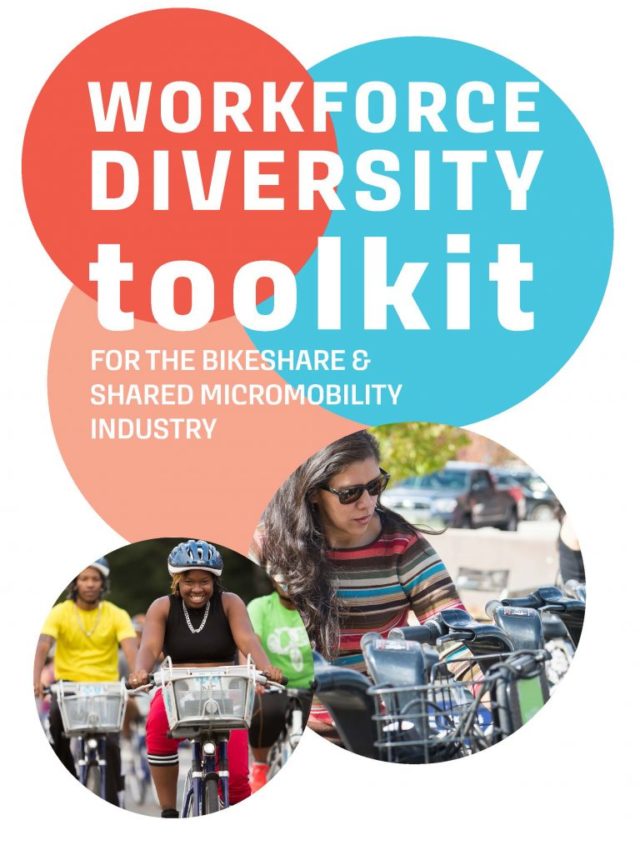Q & A With NABSA’s Executive Director
by Farrah Daniel, Better Bike Share Partnership Writer
December 3, 2019
Samantha Herr, Executive Director of the North America Bikeshare Association, joined BBSP for a Q & A about the new Workforce Diversity Toolkit — an educational resource that shares best practices for prioritizing diversity in the bike share industry.

Source: NABSA
Change is on the horizon, and now through a widened lens.
Recently, the North American Bikeshare Association partnered with BBSP to assemble what will hopefully become a go-to guide for companies and organizations in the industry, a workforce diversity toolkit. We’d be remiss not to acknowledge the strides that have been made thus far, but this abundant resource was created to bring continued awareness to the lack of representation found within the bike share workforce, especially at the leadership level.
In the official diversity toolkit release, NABSA’s Samantha Herr stated, “We need to ensure as an industry that not only are our service programs equitable, our workforce is diverse and reflective of the communities in which we serve.”
Herr and BBSP’s Waffiyyah Murray outlined steps in three loaded sections that include data, useful examples, strategies, hiring practices and more. With the help of this toolkit, leaders can work toward reflecting the broad mix of workers and advocates at the core of the bike share movement.
To take a deeper look into NABSA’s commitment to diversity and equity, I asked Herr a few questions about their past, present and future efforts.
Q: What was the reason behind creating the diversity toolkit?
A: With the toolkit, NABSA has hoped to call attention to the issue of workforce diversity, feature the leading work that organizations in our industry are already doing to meet this goal, and most of all, help organizations take the necessary first steps toward building a more diverse industry at all levels of leadership and operations.
Q: What has the response been?
A: Positive. Our 2018 Moving Forward Together Conference Keynote Speaker, Keith Benjamin, called the toolkit “amazing.” We had a very successful conference session engaging the topic and presenting the Toolkit as well. I found it interesting that I observed that most people in attendance at the conference session were women.
Q: Can you provide an update on how NABSA equity dollars leftover from the 2018 conference were spent?
A: We used these funds to support scholarships to the 2019 NABSA Conference, to support the Biking Public Project Workshop at the 2019 NABSA Conference that focused on considering all users of bike share and equity issues in bike share and transportation, translate key NABSA resources into Spanish, and to develop and produce the Workforce Diversity Toolkit.
Q: How has NABSA gone about hiring, promoting and training employees of color within the organization and in the bike share/micromobility industry?
A: Some of NABSA’s core values, as stated in our Code of Conduct, are diversity and equity. Within our board, as well as staff, we attempt to foster diversity. NABSA has worked to implement the same tools and tips that are in the hiring section of the Workforce Diversity Toolkit, and diversity is also one of the categories that we evaluate for now when we evaluate Request For Proposal (RFP) responses.
Q: What kind of equity efforts can we look forward to from NABSA in 2020?
A: Since our 2020 Conference will be held in Guadalajara, NABSA will be focusing particularly on making our resources more accessible by translating several of them into Spanish, and working toward a bilingual conference. We will also continue to do the work that we have done in striving for diversity in our conference panels and attendees, promoting workforce diversity, and continuing our partnership with Better Bike Share Partnership.
I’m grateful to Samantha Herr for having this conversation because they’re important to have — after all, diversity and equity goals are met when we work together, educate communities and further the discussion by sharing models of success.
Don’t forget to check out the self-evaluation worksheet to learn the best ways to foster diversity in your workplace, even if you’ve already created an inclusive environment.
Write us and share your thoughts on this interview! Feel free to suggest who you think we should talk to next.
The Better Bike Share Partnership is a JPB Foundation-funded collaboration between the City of Philadelphia, the Bicycle Coalition of Greater Philadelphia, the National Association of City Transportation Officials (NACTO) and the PeopleForBikes Foundation to build equitable and replicable bike share systems. Follow us on Facebook, Twitter and Instagram or sign up for our weekly newsletter. Story tip? Write farrah@peopleforbikes.org
